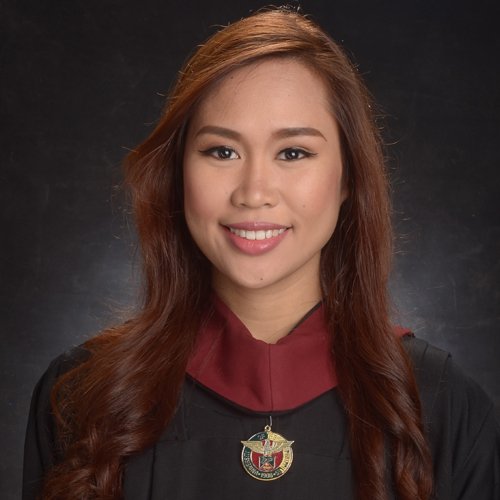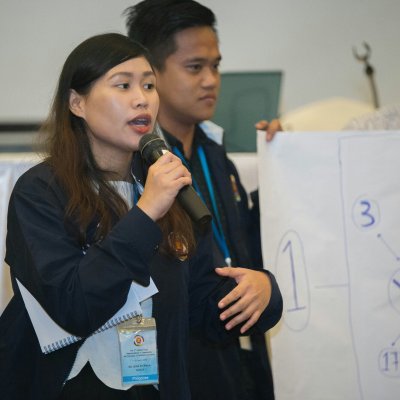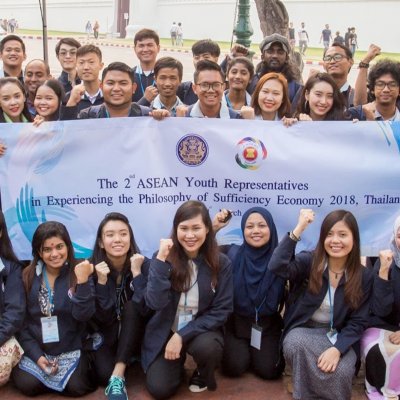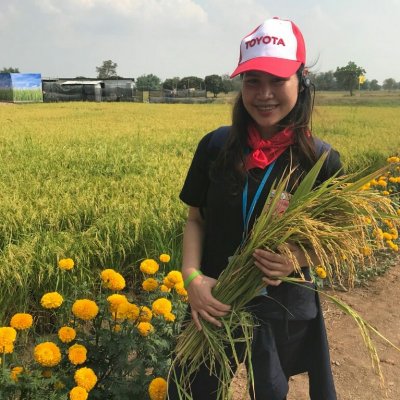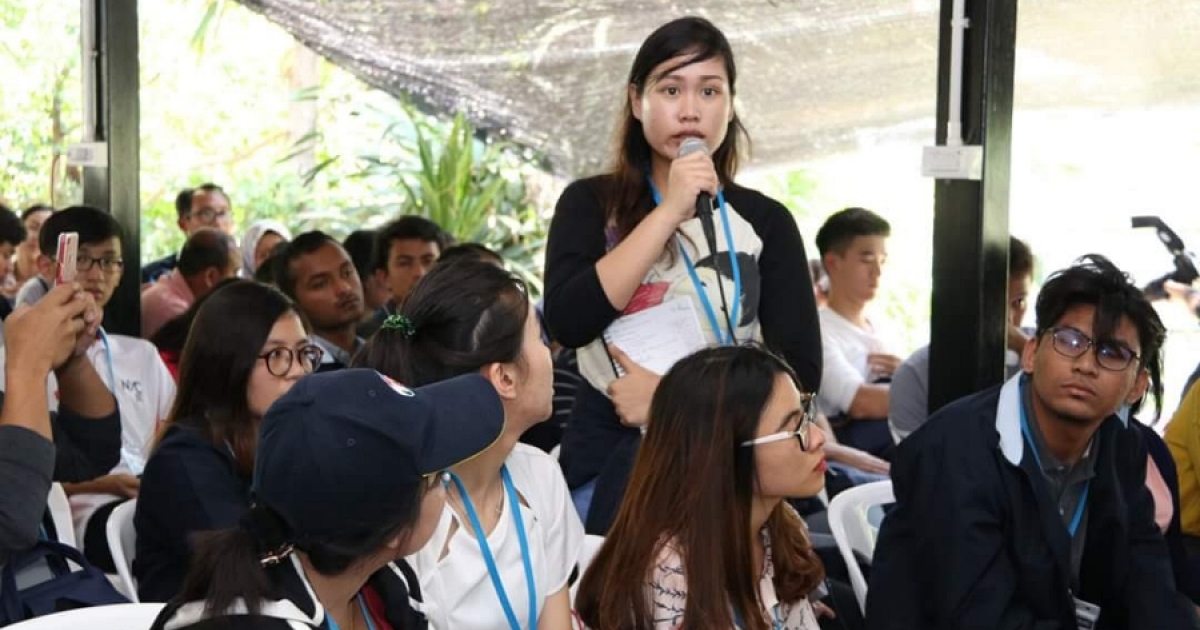“Having my GTF Mentor Made All the Difference in What I Am Doing”
Q: Tell us a few things about your country, and also your life's story!
A: The Philippines is an archipelagic country located in Southeast Asia that is made up of about 7,641 islands which are classified into three geographical areas namely Luzon, Visayas, and Mindanao. The archipelagic nature of the Philippines makes it culturally diverse - with more than 170 local languages spoken across the country and each province boasting its own history, tradition, and heritage.
The Philippines is a warm country - not only in terms of temperature and tropical climate but also when it comes to the overall hospitable and caring nature that Filipinos exude.
As for me, I came from a small city in Manila. Growing up, I was not cognizant of anything that is beyond my home and my comfort zone. I wasn’t aware of how deep the problem of poverty is in the Philippines up until I took up my undergraduate degree in Agricultural Economics. Among the different sectors in the country, poverty incidence is still the highest in the agricultural sector and those who are considered to be the poorest in the Philippines are still the fishermen and farmers. It is ironic that those who work hard to produce food for the country are the ones who are most vulnerable to hunger.
In every field visit that I had, I’ve witnessed the plight of farmers. However, it struck me the most how difficult life can get for some when I had to conduct a study in a remote island in Palawan where potable water has to be shipped from the mainland by boat and electricity is only supplied in some parts of the island intermittently by a 25kVa diesel generator depending on the supply of diesel. The residents of the island rely on seaweed farming as their source of livelihood however, due to each passing production cycle becoming more unprofitable, some have to work as seaweed farmers in the day and fishermen at night. People’s access to basic necessities such as clean water and energy are limited and there is a decreasing number of children in the island who finish secondary education. Life on the island is difficult and yet, the farmers were among the happiest people I have met - they smile and laugh despite the hardships and extend kindness in any way they can. Despite being a stranger, a family on the island offered me to stay at their home, shared their food, and – in spite of my insistence not to – still gave the only bed they have and chose to sleep on floor mats instead for the whole duration I was conducting my study on the island. Everything was given without a single cent taken from me as a payment and it was then that I understood deeply what Filipino hospitality meant. During numerous field visits across several provinces in the country, farmers often offer what they have and I experienced great generosity and kindness from them. I could not fathom how those who have so little are still the ones who are most willing to offer what they have.
Such experiences on the field pushed me to start doing what I can to be of service to my country and its people. I started by creating greater awareness in youths regarding the problems faced by the country that they are unaware about or they refuse to acknowledge like I did when I was growing up. I became passionate in community development and started to take part in projects that develop youths’ movement and action towards development under several organizations such as Gawad Kalinga and ASEAN Youth Leaders Association. I also started to promote sustainable development in the country by serving as a global schools ambassador under the UNSDSN Youth. I am given the platform to empower youths to step up and be the leaders that they need to be and to start their own initiatives in their communities. I wish that to see changes someday in the living conditions of those who are in rural areas and those who live below the poverty line.
We live in a world where we have achieved tremendous medical and technological breakthroughs and yet, every year, around 6 million children under the age of 5, die from diseases of poverty - diseases that have been eliminated in rich countries.
We are at a point where natural disasters have been picking up in intensity and have been increasing in numbers and those who are living in extreme poverty remains to be the most vulnerable to the effects of climate change. We live at a time where sudden irreversible changes in our environment can occur over a short period of time and can cause disastrous global impacts due to the immense pressure and force we have placed on the planet. Human activities have tremendously shaped Earth’s ecological landscape and evolution that we have entered the 6th mass extinction and we are experiencing major loss of habitats and biodiversity. We live in the midst of information revolution wherein due to tremendous technological breakthroughs, it has now become possible for us to store, process, and transmit massive amount of information and data in an unprecedented scale that was unimaginable in the past. However, we are also facing greater risk of disinformation. We live in a hyper-connected society with ubiquitous connectivity that allows us to communicate and share information in vast amounts at such fast speed and yet, relationships and communication these days lack the aspect of human connection we crave and people end up feeling isolated in an age of digital connectivity.
We are now faced with several challenges such as how will we be able to feed the growing population? How will we be able to provide for the population’s increasing need for clothes, food, energy, security, housing, and education? How can we build a world that is resilient in the face of all these problems in the 21st century?
The concept of a better world for me is a world where government, organizations, businesses, and individuals find new approaches to collaborate, learn, and move towards enriching people’s lives and creating positive impacts for the world. We must stop viewing the world through myopic lenses and place above our self-interests the innate duty to act together to achieve sustainable development. We need to reshape our knowledge, skills, values, and attitudes to realign our actions and motives towards achieving the goal of creating a sustainable future. We must foster new types of leaders that will engage and assume active roles, both locally and globally, to face and resolve global challenges and become proactive contributors in creating a more just, peaceful, tolerant, inclusive, secure and sustainable world. We need to acknowledge and realize that across several divides that we are facing – political, racial, cultural, religious, and linguistic divides – we have a common need and purpose which is to create a better world for future generations to live in.
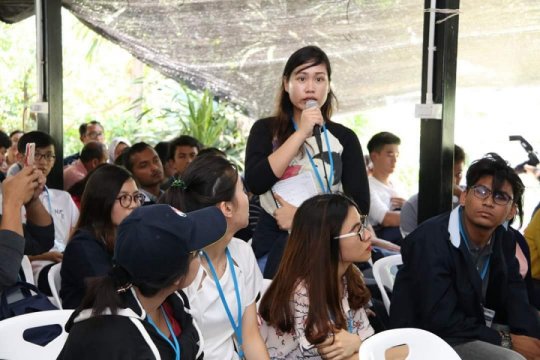
Q: What are some of the key challenges in your society?
A: As a developing country, the Philippines still face numerous challenges such as extreme poverty, widening inequality across income brackets, regions, and sectors, lack of access to primary education and reproductive health care. Recently, the country’s war on drugs that has led to the death of at least 12,000 Filipinos belonging to the urban poor has been a controversial human rights issue. Among all the challenges faced by the country, one of the hardest to accept is the silent response of the majority regarding these grave issues. Injustices are buried and forgotten in a month's time and people have succumbed to apathy - learning to shrug things off easily.
Q: As a young individual what are a few of the hurdles that you had to overcome up until today?
A: One of the hurdles I am facing now as a young individual is finding my passion and my purpose in today’s society. ‘Ikigai’ is a Japanese concept meaning “a reason for being”. Ikigai is the intersection where people get to do what they love, what the world needs, what they are good at, and what they can get paid for all at the same time. It is the point where a person’s passion, mission, vocation, and profession coincide. As a young individual, I found it difficult to find what my Ikigai is. I somehow knew the direction I wanted to take after I finished my undergraduate degree however, the passion to serve and the drive to create change got lost in the midst of my need to make a living, create some personal security, and meet the expectations that my family had.
Before I got into the mentoring program, I found myself at crossroads - trying to decide whether or not I should change careers. With my mentor’s guidance, I was led back to the path of rediscovering what it is that I wanted to pursue. Despite not finding my Ikigai yet, I am still thankful that through the Telemachus Programme, I met my mentor who guides me, believes in me, and has pushed me to explore possibilities that could one day lead me towards the meaningful career that is aligned with my skills and passion that I am searching for.
In all honesty, having Roger as a mentor made all the difference in what I am doing and what I am prioritizing now. Before, I was deadest in meeting the expectations of my parents to pursue law and thought that I can just keep on pursuing my passion in my spare time through volunteer works. When Roger first asked the question of what I wanted to do someday, I could not give a concrete answer - I felt paralyzed by all the opinions and expectations set by my family and peers dictating which career path I should take. I realized that I never got much chance to think and consider what is it that I really wanted to do in the future. There was this innate fear of the possibility that I will someday regret the decision I will make if I take matters into my own hands and decide on my own.
However, Roger has helped me understand that I cannot really follow other people’s plan for my life despite the good intentions they have to lead me to a better place. I must find the answers within myself and decide what I want to do and who I want to be in the future. People carve out their own path to achieve the life they want to have someday. Roger has reminded me constantly that my plans may not work perfectly as I had planned it to be however, life is a continuous process of learning and self-discovery and I might eventually find myself, someday, pursuing something else.
I’m thankful to have Roger as a mentor. He gave me the push I needed to move beyond my comfort zone and discover where my interests lie. If it weren’t for him, I would not even be considering the options I am taking now.
Q: Do you have a lesson that life has taught you and you would like to share?
A: Do what you can to be of service to others and always try to make the world a better place.
Q: Name a project, a foundation or a person in your country that you think is doing great work in helping improve other people's lives!
A: Gawad Kalinga Community Development Foundation Inc. (GK) is doing such great work in building communities all over the country by transforming chaotic slums into peaceful communities and by developing the donated vacant lands into permanent space and housing for homeless families who are among the poorest of the poor in the country. Beyond the provision of housing, GK also creates sustainable livelihoods and social enterprises that provide employment for its community members and generate income to continue transforming these communities to become strong and lasting ones. GK had also started other amazing initiatives and one of which is the Kusina ng Kalinga program (KnK) or Kitchen for caring, a campaign to end hunger and malnutrition by providing lunch meals to children in public schools, in the streets, and in conflict areas. Through KnK, people are able to sponsor a child’s meal for PhP 15 ($0.29) a day or PhP 3,300 ($62) for a whole year. Such initiatives, help decrease the number of children who are going to school with an empty stomach.
As a member of GK’s UPLB chapter, I was able to immerse myself in these GK communities by volunteering in the construction of homes, preparation of meals for the children who are part of the Kusina ng Kalinga (KnK) program, and facilitation of support programs such as health, education, and values formations lessons or seminars. I have witnessed transformation in the life of the GK community members who moved from poverty to prosperity.
Q: Athena40 is the first ever global selection of the top 40 women forward thinkers, commentators, activists, authors, academics, entrepreneurs, executives, innovators. Can you think of a truly innovative and forward-thinking woman from your country that you wish to nominate for the Athena40 global list?
A: Lei Motilla - Incoming executive director of the Singapore-led ASEAN Youth Community. She has made her mark in policy development and social marketing for the Sustainable Livelihood Program of the Philippines' Department of Social Welfare and Development, and is an academic fellow of the Young Southeast Asian Leaders Initiative (YSEALI). She has also worked as president of the ASEAN Youth Leaders Association in the Philippines and as youth development specialist at Fundlife International with survivors of typhoon Haiyan.
Q: Share with us a phrase, a poem or a story that you love or you find interesting!
A: Life’s most persistent and urgent question is, “What are you doing for others?’”
-Martin Luther King Jr.
Q: Tell us one thing that you have learned from your mentor.
A: With all the work that Roger does, I constantly ask him how he manages to find work-life balance. I used to feel that a day is not enough for all the work that I need to do and passion I want to pursue. I felt like I am left behind since at this point of my life, I should have worked things out already and have decided which direction I should go to and yet, that was not the case.
Roger’s experience has taught me that there is no specific timeline that I should pressure myself into. He does not worry about time or age. Instead, he focuses on seeking ways where he could further add his mark and contribute his skills in his field. It was only after doing several years in consultancies did he realize that his greatest contribution was to train and teach and at the age of 60 – busier than ever in his job and doing a stint in India- he took up his PhD. It was then I realized that time is not much of a scarce resource that I consider it to be. In Roger’s words, “We have all the time in world until the tap gets turned off!” I learned that it is never too late to expand my horizons, explore my options, and hone my capabilities. Roger’s experience is definitely a testament to his lessons and I am grateful to have him as a mentor.


